The Best Electrical Estimating Software
We’ve reviewed the top electrical estimating software on the market for electrical contractors of all sizes. These platforms help estimate costs and generate proposals for residential and commercial projects.
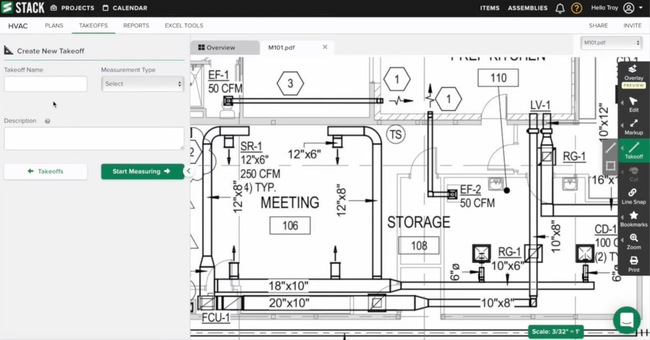
- Easy to use and modern interface
- Free version available
- Unlimited takeoffs in paid version
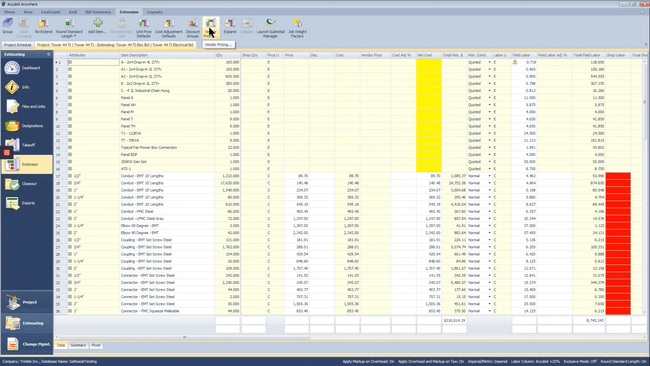
- Customizable database
- Integrates with LiveCount for quantity takeoff
- Integrated supplier pricing module
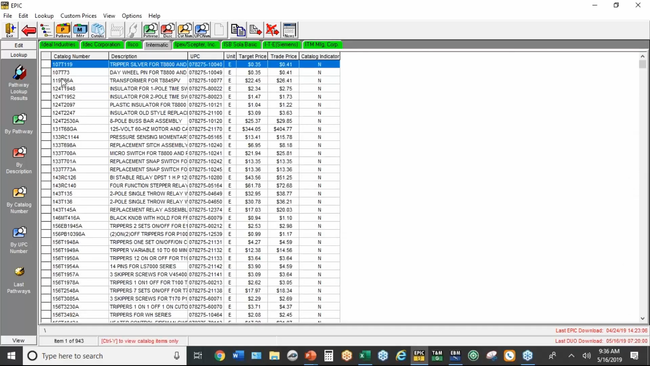
- Can create assemblies and customize wiring methods
- Responsive customer support
- Provides efficient training options
Electrical estimating software helps contractors accurately estimate resource and labor costs for each project.
- STACK: Best Overall
- Accubid: Best for Change Management
- Electrical Bid Manager: Best Pricing Tools
- PlanSwift: Best for Estimation Editing
- McCormick Estimating: Best for Labor Tracking
- PataBid Quantify: Best Multi-Document Takeoff Workflow
STACK - Best Overall
STACK simplifies the bid process for electrical contractors through its detailed proposals module. After you accurately measure and estimate costs, the system consolidates all pricing information to generate a proposal document quickly. You can customize these to include individual line items or present a lump sum.
The module also has customized dashboards that provide at-a-glance KPIs for metrics like selling price and profit margin per project. This ensures that costs are accurate while creating your proposals and that you add enough markup to ensure profitability. This is essential for electrical contractors already operating on tight margins.
STACK’s Takeoff and Estimate system starts at $2,999/user/year for 1-2 users, and $1,999/user/year for 3-4 users. It’s a great option for teams looking for a strong suite of features, including takeoff and markup, estimating, plan, spec & document management, and reporting tools.
Accubid - Best for Change Management
Trimble Accubid Anywhere includes an extensive change management module that helps contractors track and adapt to project modifications. The platform stores all original estimates so you can use them for updates. For example, if there is a change order for new pricing, you can keep the assemblies from the original estimate and just update the costs, saving you time on manual rewrites.
Additionally, the module lets you use multiple pricing methods during the estimating process. Other methods include:
- List pricing: Use a fixed standard or catalog price for materials without considering discounts or adjustments.
- Net pricing: Account for discounts, promotions, or negotiated rates that change the final material price.
- Overhead and markups: Consider additional costs or indirect expenses like equipment maintenance that are added to the final price.
Unfortunately, Trimble Accubid Anywhere requires a custom quote for exact pricing. That said, its cloud-based all-in-one system is built for larger teams managing commercial projects.
Electrical Bid Manager - Best Pricing Tools
Electical Bid Manager offers its EPIC Pricing tool that connects the system to your local electrical supplier to create more accurate bid prices. It contains over 2 million electrical items and over 100 manufacturer catalogs, so you can shop around to find the best prices for all your materials.
Further, EPIC includes both trade and target pricing, so you can be sure you’re getting a good deal. Trade is the suggested retail price, while the target provides a general benchmark of the supplier’s rates. Easily compare these for common or rarely used items across different catalogs, helping you make more competitive bids and reduce material costs.
The system automatically updates your pricing each month, so you don’t have to spend time manually revising costs. It’s also an affordable system, with pricing starting at $800/user/year, making it a strong option for those looking for an electric-specific system.
PlanSwift - Best for Estimation Editing
PlanSwift includes a flexible takeoff module for electrical contractors working on projects of all types. The tool lets you take accurate measurements of lengths, areas, counts for wiring, and fixtures through an easy point-and-click UI. This is done directly on the floor plan, so each measurement provides accurate material amounts like wire length.
The takeoff module also includes its autocount feature that automatically counts plan symbols. It’s pre-built to recognize symbols specifically for the electrical industry, like power outlets, switches, electrical panels, and wiring components. This is great for contractors handling complex designs or large-scale installations, as it eliminates the manual counting processes and reduces manual errors.
While PlanSwift’s estimating system is effective, its pricing is a bit steep. The Professional plan starts at $2,000/user/year, which may be too expensive for budget-conscious businesses. Those looking for a more affordable option may want to look at Electical Bid Manager.
McCormick Estimating - Best for Labor Tracking
McCormick Estimating software includes a flexible labor costing and tracking system for electrical contractors. It includes pre-built labor units for the electrical trade, letting you quickly add industry-standard rates. Alternatively, you can customize each rate and unit to match your company’s needs. This can be done all on one screen, making it easy for users to add both pre-built and custom rates on a single estimate.
Also, the system includes unlimited job storage, so you never run out of space when adding labor. Allocate employees for different jobs, compare their hourly rates vs. the estimate, and analyze total labor rates to have full control over spending. This can help companies become more profitable with better visibility into their workforce expenses.
McCormick Estimating is best for larger businesses that need detailed labor tracking for complex projects. It may also require a significant time investment for training, as some users have reported a high learning curve due to its extensive feature set.
PataBid Quantify - Best Multi-Document Takeoff Workflow
PataBid Quantify’s multi-document takeoff workflow allows schedules and spreadsheets to live directly alongside drawings. This removes the redundant spreadsheet copy-paste and retyping drudgery so common for growing contractors. An equipment list or cable schedule opens in this workspace, so estimators can clean, organize, and consolidate quantities before they ever hit the estimate.
Your estimators can perform takeoff directly from the schedule and commit assemblies into the estimate. From there, it’s easy to switch back to drawings and resume graphical takeoff without breaking the workflow.
Because document- and drawing-based takeoff occur in the same place, every quantity links to its original source document. That way, the audit trail always shows exactly where each takeoff entry originated.
PataBid Quantify is highly scalable, allowing multiple estimators to work on larger bids with several schedules, spreadsheets, and drawings simultaneously. While public pricing isn’t listed, this bidding and estimating software is best for solo operators, small plumbing or electrical shops, and emerging contracting companies.
What is Electrical Estimating Software?
Electrical estimating software helps electricians, electrical engineers, and contractors plan out expenses related to upcoming and current projects. Sometimes labeled as electrical estimating takeoff software, these products form a specific subset of construction estimating software that focuses only on streamlining electrical work projects, from new construction to remodels to basic maintenance.
To start, the automated estimates calculate things such as labor, materials, and equipment costs, as accurately as possible for submitting a bid price for a new project or informing a client of expected charges. Software allows for customization to personalize different bids and quotes before submission. Other tools for electrical estimators include basic project management modules, construction takeoff, and maintaining customer relationships.
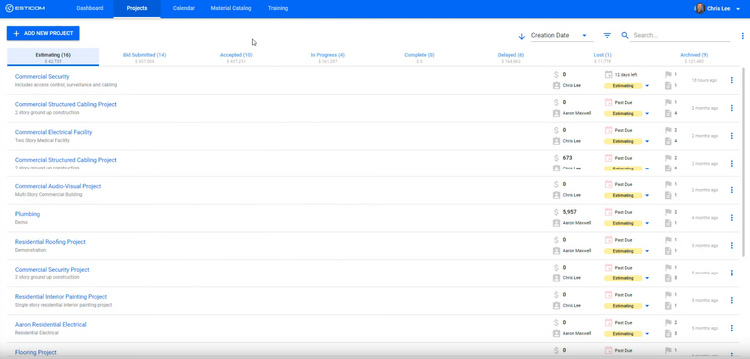
Key Features
- Quote and bid management: Calculate costs for projects while managing customer relationships and streamlining the request for proposal (RFP) process before making formal bids
- Labor cost tracking: Measure potential employee hours and any job-specific rate management for upcoming projects
- Material and equipment cost database: Calculate real-time material and equipment costs based on known base rates for purchase or rental along with quantity requirements
- Historical data: Input rates from previously performed work and construction takeoffs into new bids to better calculate potential costs for all situations, such as customer change orders
- Document management: Retain past quotes in a digital storage and retrieval system for future access when making new job estimates
- Estimate-quote conversion: Use the data obtained from internal job cost estimates to generate customer-facing quote or proposal documentation
- Project management: Once a bid is accepted, arrange all details for a project moving forward, such as necessary laborers, any required materials, and so on
- Scheduling: Arrange a schedule of labor and material delivery (if necessary) in advance
- Customer management: Maintain customer contact information, past project details, bid history, and other relevant information for better customer support
- Billing and invoicing: Use estimates and quotes to accurately bill clients for services, then send professional invoices
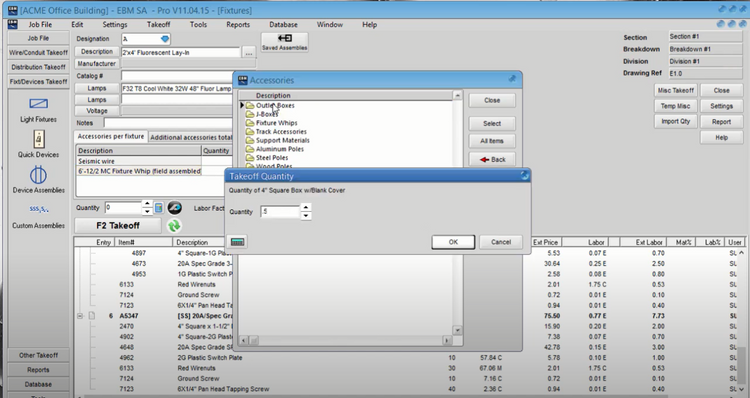
Primary Benefits
Electrical estimating software provides many benefits to electricians and engineers, allowing your company to:
Save Time
Automated estimating software helps to reduce time spent on calculating and preparing quotes or bids. Previously, electricians would have to measure conduits, wires, and other dimensions manually in order to estimate what materials were needed. Then they had to determine how many labor units were necessary and what, if any, equipment had to be used. Through electrical estimating software, blueprints and schematics can be used to gain this information in an instant.
Increase your bid win rates by preparing and sending out quotes to customers with more efficiency. Electrical contractors who use software can double or triple their quote output, increasing the chances of a successful bid. And with less time spent making bids, your electricians can spend more time actually working in the field on construction projects, remodels, or repairs.
Increase Accuracy
Even small electrical projects can go over budget due to unforeseen circumstances. An electrical estimating software provides an improved ability to ensure project profitability by producing more reliable estimates using automated calculations from construction takeoffs and historical data. No more plugging data into an Excel spreadsheet and making manual calculations when you use an automated estimating system.
Construction takeoff tools use blueprints and schematics to ease the estimation process by showing the exact dimensions related to a project. For example, you can better estimate how much electrical wiring will be necessary for a new home construction if you know the length of walls, ceilings, and so on. You’ll also learn whether outlets are needed for low voltage or high voltage output, if any HVAC work is necessary, and other important details for the quote process.
Historical data related to past successful bids and jobs is useful for attaining greater accuracy. The more accurate your price quotes, the higher your chances of winning bids. These accurate estimates lead to accurate quotes for your customers. Knowing what they’re expecting to spend on a project can help ensure they actually have the means to pay when it’s time for invoicing.
Be Selective and Competitive
It’s no secret that the best bid often wins the contract. For most customers and clients, that means whichever quote is lowest is the automatic winner, while others prefer short turnaround times. Electrical estimating software reveals lowered job costs through the identification of cost control strategies like alternative material sourcing or subcontracting certain labor units. By utilizing software to build better bids, you can identify which jobs are worth the costs.
For example, you might realize a particular job will have higher labor costs than anticipated while preparing the estimates, allowing you to back out of the bidding process early and avoid expensive complications later. In other cases, material prices might have increased due to shortages. Using software to track material pricing in real-time gives your electrical bid manager a chance to offer clients more affordable substitutions during the bid process, providing better customer support from the start and potentially increasing profit margins.
Pricing Guide
SaaS options range from $19 per month up to $300 per month per user. One-time perpetual license fees range from $990 to $1,445. Customizable hybrid systems are available, combining the best of both into one easily accessible yet secure platform.
Electrical estimating software pricing depends on the scope of your business. Small, independent contractors won’t need the full-service software a large construction firm would want. Another factor in the pricing will be whether you want an on-premise or Cloud-hosted solution. For instance, an on-prem product might have a one-time perpetual license fee, while a Cloud-based option would be a monthly SaaS.
The right solution for your company will depend on your budget and business model. For example, if you often perform quotes on the go while meeting with customers on-site, a user-friendly SaaS with on-screen takeoff tools would be best for your needs.





























